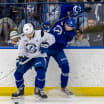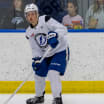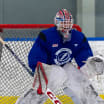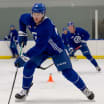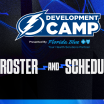Sleeping on the job
Bryan Burns polled the Lightning locker room to find out what pregame nap routines the players have

© Scott Audette
Personally, if I'm in the mood for a great nap, I throw a soccer game on the TV, and I'm out in 10 minutes. That's not a knock on soccer. I enjoy watching the sport and used to cover it prior to my current beat. But there's something about the nonstop action, the rhythmic cadence of the announcers' voice, the ebbs and flows of the crowd, the crescendo as the ball nears the goal and, maybe most important, the lack of any whistles during play that has me sleeping like a baby. The only nap better than a soccer nap is a nap during the Masters Golf Tournament with the hushed tones of the announcers and birds chirping in the background and that Masters' music which, let's be honest, might as well be a lullaby.
In the National Hockey League, however, naps aren't just an occasional luxury. They're as much a part of the fabric of the sport as a coach pulling the goaltender down a goal with under two minutes remaining.
Perhaps there's no more crucial element to a NHL player's daily routine than the pre-game nap. Home or away, family man or bachelor, every professional hockey player takes a nap before that night's game, almost without exception.
How did this phenomenon start?
It's hard to pinpoint exactly. But a quick survey around the Tampa Bay Lightning locker room reveals that the practice is typically learned in junior hockey and only intensifies as the level goes higher. In junior, the typical nap lasted 90 minutes. By the time a player reaches the NHL, naptime might near three hours.
"I don't think I was (napping) in AAA," said Lightning forward Yanni Gourde, who naps two hours and 15 minutes before every game. "We were in school more and the games were on the weekend in the afternoon, so I don't think I was doing that in midget or AAA. It started in junior."
And why did it start?
"Probably because everybody was doing it and I was like, 'Oh, let's try a nap here,'" Gourde said, laughing.
Gourde is an interesting case. More than any of the Lightning players I talked to for this story, his is a regimented routine before every game.
- In bed by 1:15 p.m.
- Up at 3:30 p.m.
- Make coffee upon waking
- Shower
- In the car and off to the rink by 4:15 p.m.
- Start drinking his coffee at the beginning of the drive and finish it while pulling into the players' compound at AMALIE Arena
- Eat a bite at the rink
- Take a shot of double espresso
- Ready for game time
Wait, coffee and a double espresso? Wouldn't all that caffeine make one jittery?
"Sometimes I feel like my pressure's low or something, I'm like dizzy for a second or a few minutes (after the espresso) and then I drink something else with a little bit more sugar and then I'm fine," Gourde explained. "But sometimes I'm like, I might have exaggerated on the coffee a little bit here."
Gourde and his wife Marie welcomed their first child Emma into the world during last season's playoff run. Any parent knows a newborn can make naptime more difficult if the baby's crying while daddy's trying to sleep. A lot of Lightning players have families too. In the Stralman household, with four young children and wife Johanna trying to keep order, it's an unwritten rule when daddy comes home from morning skate, there needs to be quiet so he can get his rest.
Emma Kate Gourde pic.twitter.com/W8sMuF0EQS
— Yanni Gourde (@YanniGourde) May 2, 2018
Sometimes that's easier said than done.
"There's definitely some disturbance in the house once in a while, whether it's a play date or the kids playing games," Stralman said, smiling, before adding it doesn't matter if he gets 30 minutes or an hour and 30 minutes of sleep. "Right now, we have construction going on, so you hear a chainsaw going off and you wake up or they start with the nail guns."
J.T. Miller and his wife Natalie had a baby girl, Scottlyn Marie, in between the first and second rounds of the playoffs last season. Miller and his daughter are on the same afternoon nap sleep schedule, which is ideal but certainly not the norm.
"She goes down at 1 o'clock, so we go down together now. It's perfect," Miller said. "It's nice and quiet in the house. Or I try to make sure I'm sleeping by 1 because that's when she goes down and it's peaceful in the house. I sleep probably from 1 to 3, or at least in bed for a couple hours, whether I'm just relaxing or actually sleeping."
Miller brings up a good point. The pre-game nap isn't necessarily about sleeping the whole time. Sometimes, it's just about relaxing in bed and binge watching TV shows, which usually ends with the player dozing off for a bit.
"Koeks [Lightning defenseman Slater Koekkoek] just gave me a show to watch, I think it was called "The Sinner" on Netflix," Anthony Cirelli said at morning skate prior to the Bolts' showdown with Nashville. "I'm going to try that show today, so probably watch a couple episodes of that and then maybe around 1:30, 2-ish is when I start going down."
More than anything, it's that relaxation period during the pre-game nap routine that allows the player to decompress and properly prepare for the game later that night.
"I have a set time when I'll lay down," Lightning forward Tyler Johnson said. "Usually I'll set my alarm for about two hours. I'm not sleeping that whole time but that's just kind of what I limit myself to. Really I probably sleep 45 minutes of that, just kind of laying there watching some TV and hopefully I can fall asleep. There are times where I'm laying there and I can't sleep and I say, 'Hey, I'm not going to nap. I'm just going to lay there.' So, it just kind of depends."
So then the real question becomes: Does a good pre-game nap translate to a good game on the ice? If a nap is interrupted and a player can't get to sleep, does that mean he'll play poorly later that night?
"There are so many times during the year where I just justify every single situation that happens, so I don't really know," Miller answered. "Sometimes I'll sleep for 10 minutes and wake up and score two goals and you think that's the way it's supposed to be. But it can go the other way too. I try to get some sleep regardless of how long it is. I also try to feel it out. I don't try to force two hours out of me. If I sleep for 45 minutes that's good. If I sleep for two-and-a-half (hours), which I can do. I'll do that too."
Miller's not superstitious, so if he gets 10 minutes of sleep and scores two goals, he won't take a 10-minute nap the next game in hopes of scoring another pair he said. Gourde, who sits in the stall directly to his left in the Lightning locker room, is the opposite.
"I make fun of the guys that are always doing the same thing," Miller said. "Gourdo does that stuff all the time. I'm all over him about it."
It can be easier to nap at home because of the comforts of your own bed. But road naps are good too because once morning skate is over and the pre-game lunch at the hotel is eaten, there's really not much to do until the bus leaves for the rink a few hours later.
"Home or road, it's the same," goalie Louis Domingue said. "Head hits the pillow and you're out."
And every game day, it's the same in the life of a NHL player: a morning skate/workout, a little lunch and then off to bed for a some shuteye.

